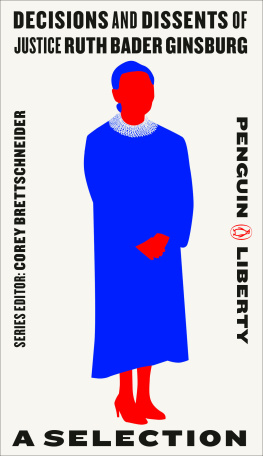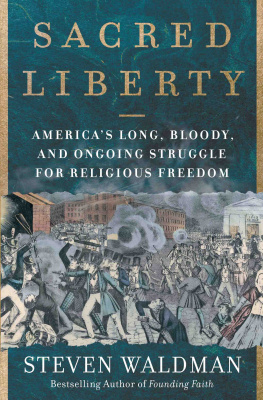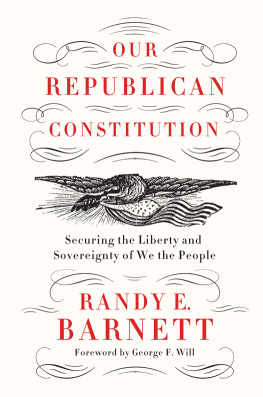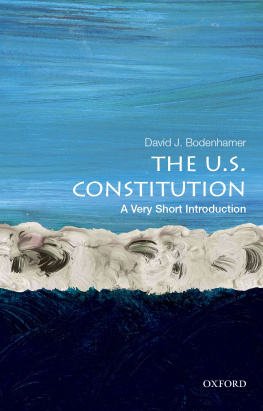Breyer - Active liberty: interpreting our democratic Constitution
Here you can read online Breyer - Active liberty: interpreting our democratic Constitution full text of the book (entire story) in english for free. Download pdf and epub, get meaning, cover and reviews about this ebook. City: New York;USA;United States, year: 2005;2007, publisher: Knopf Publishing Group, genre: Politics. Description of the work, (preface) as well as reviews are available. Best literature library LitArk.com created for fans of good reading and offers a wide selection of genres:
Romance novel
Science fiction
Adventure
Detective
Science
History
Home and family
Prose
Art
Politics
Computer
Non-fiction
Religion
Business
Children
Humor
Choose a favorite category and find really read worthwhile books. Enjoy immersion in the world of imagination, feel the emotions of the characters or learn something new for yourself, make an fascinating discovery.

Active liberty: interpreting our democratic Constitution: summary, description and annotation
We offer to read an annotation, description, summary or preface (depends on what the author of the book "Active liberty: interpreting our democratic Constitution" wrote himself). If you haven't found the necessary information about the book — write in the comments, we will try to find it.
Breyer: author's other books
Who wrote Active liberty: interpreting our democratic Constitution? Find out the surname, the name of the author of the book and a list of all author's works by series.
Active liberty: interpreting our democratic Constitution — read online for free the complete book (whole text) full work
Below is the text of the book, divided by pages. System saving the place of the last page read, allows you to conveniently read the book "Active liberty: interpreting our democratic Constitution" online for free, without having to search again every time where you left off. Put a bookmark, and you can go to the page where you finished reading at any time.
Font size:
Interval:
Bookmark:
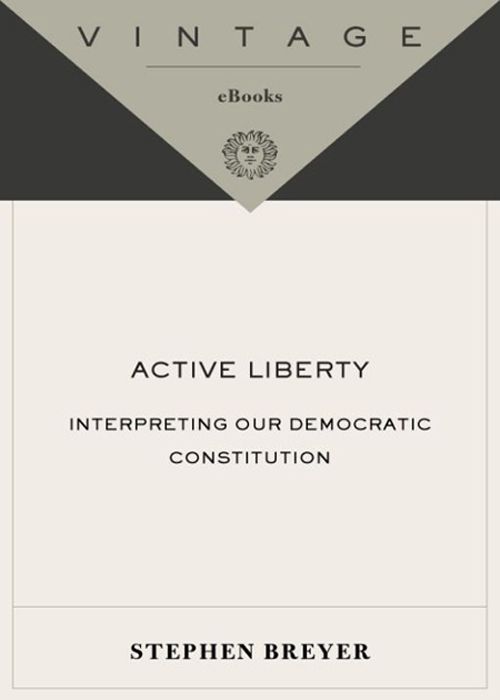
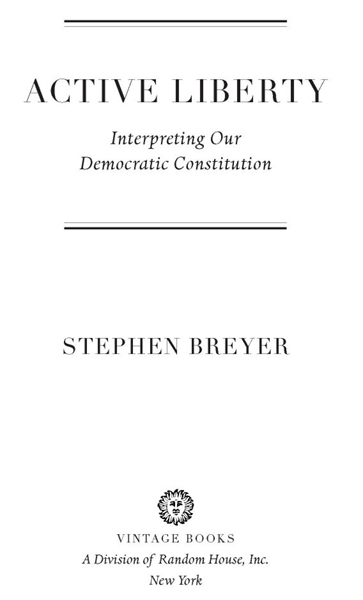
Table of Contents
To my brother and fellow judge,Chuck
Acclaim for Stephen Breyers
ACTIVE LIBERTY
Fluid.... Should show up on every litigators bookshelf, providing how-to advice like a do-it-yourself guidebook to judicial reasoning.New York Law Journal
Breyers prose is admirably simple and clear, and his discussion shows a keen legal intellect that espouses broad values rather than narrow theories, and a deep, humane concern with fostering democracy and the well-being of the citizenry. This will be essential reading at a possibly watershed moment for the Supreme Court. Publishers Weekly (starred review)
Impeccable advice for the powerful in all walks of life.... Breyer has earned a reputation as one of the Supreme Courts more coherent thinkers. The Boston Globe
Rather than looking exclusively to the past, Breyer appreciates the need to engage the Constitution as a living document. Booklist
A good introduction to how judges observe the rule of law. Written in clear language for the lay readerthough backed by scholarly notes. Library Journal
A breath of fresh air.... His calm tone, straightforward language, wise understanding of the judicial craft, and respectful engagement with rival views could not be more timely. Policy Review
Acknowledgments
This book originally took the form of the Tanner Lectures on Human Values presented at Harvard University in 2004. Gordon Wood and Robert George provided valuable commentary on those lectures. The University of Utah Press will publish an archival copy of the lectures and commentary. I presented an initial version of the Tanner Lectures as the James Madison Lecture at New York University Law School in 2001 (published as Our Democratic Constitution, 77 New York University Law Review, 2002).
I am grateful indeed for the time, effort, and advice of Paul Gewirtz and Robert Henry. I also very much appreciate the constructive commentary of the people who have read earlier drafts of this work, including Akhil Amar, Michael Boudin, Erwin Chemerinsky, Norman Dorsen, Ronald Dworkin, William Eskridge, Owen Fiss, Charles Fried, Elizabeth Garrett, Richard Pildes, Richard Posner, Robert Post, and Laurence Tribe; and, a special thanks, too, to Emma Rothschild. Their critiques, their ideas, and their suggestions have helped me enormously, adding much of value to the enterprise. I thank all those I have mentioned and others as well for their many contributions. I thank Patricia Hass, my editor, and the others at Knopf who worked long, hard, and effectively at bringing this book to publication.
INTRODUCTION
The United States is a nation built upon principles of liberty. That liberty means not only freedom from government coercion but also the freedom to participate in the government itself. When Jefferson wrote, I know no safe depository of the ultimate powers of the society but the people themselves, his concern was for abuse of government power. But when he spoke of the rights of the citizen as a participator in the government of affairs, when Adams, his rival, added that all citizens have a positive passion for the public good, and when the Founders referred to public liberty, they had in mind more than freedom from a despotic government. They had invoked an idea of freedom as old as antiquity, the freedom of the individual citizen to participate in the government and thereby to share with others the right to make or to control the nations public acts. 1
Writing thirty years after the adoption of the American Constitution and the beginnings of the French Revolution, the political philosopher Benjamin Constant emphasized the differences between these two kinds of liberty. He called them the liberty of the ancients and the liberty of the moderns. He described the liberty of the ancients as an active liberty. It consisted of a sharing of a nations sovereign authority among that nations citizens. From the citizens perspective it meant an active and constant participation in collective power; it included the citizens right to deliberate in the public place, to vote for war or peace, to make treaties, to enact laws, to examine the actions and accounts of those who administer government, and to hold them responsible for their misdeeds. From the nations perspective, it meant submitting to all the citizens, without exception, the care and assessment of their most sacred interests. This sharing of sovereign authority, Constant said, enlarged the citizens minds, ennobled their thoughts, and established among them a kind of intellectual equality which forms the glory and the power of a people.2
At the same time, ancient liberty was incomplete. It failed to protect the individual citizen from the tyranny of the majority. It provided a dismal pretext for those who advocated new kinds of tyranny. Having seen the Terror, Constant was well aware of the dangers of subjecting the individual to the unconstrained authority of the group; and he warned against borrowing from the ancient republics the means for governments to oppress us. Constant argued that governments must protect the true modern liberty. That liberty, civil liberty, freedom from government, consisted of the individuals freedom to pursue his own interests and desires free of improper government interference.3
Constant argued that both kinds of libertyancient and modernare critically important. A society that overemphasizes ancient liberty places too low a value upon the individuals right to freedom from the majority. A society that overemphasizes modern liberty runs the risk that citizens, enjoying their private independence and in the pursuit of their individual interests, will too easily renounce their rights to share political power. We must learn to combine the two together.4
In this book, while conscious of the importance of modern liberty, I seek to call increased attention to the combinations other half. I focus primarily upon the active liberty of the ancients, what Constant called the peoples right to an active and constant participation in collective power. My thesis is that courts should take greater account of the Constitutions democratic nature when they interpret constitutional and statutory texts. That thesis encompasses well-known arguments for judicial modesty: The judge, compared to the legislator, lacks relevant expertise. The people must develop the political experience and they must obtain the moral education and stimulus that come from... correcting their own errors. Judges, too, must display that doubt, caution, and prudence, that not being too sure of oneself, that Judge Learned Hand described as the spirit of liberty.5
But my thesis reaches beyond these classic arguments. It finds in the Constitutions democratic objective not simply restraint on judicial power or an ancient counterpart of more modern protection, but also a source of judicial authority and an interpretive aid to more effective protection of ancient and modern liberty alike. It finds a basic perspective that helps make sense of our Constitutions structure, illuminating aspects that otherwise seem less coherent. Through examples, my thesis illustrates how emphasizing this democratic objective can bring us closer to achieving the proper balance to which Constant referred. The examples suggest that increased emphasis upon that objective by judges when they interpret a legal text will yield better lawlaw that helps a community of individuals democratically find practical solutions to important contemporary social problems. They simultaneously illustrate the importance of a judges considering practical consequences, that is, consequences valued in terms of constitutional purposes, when the interpretation of constitutional language is at issue.
Next pageFont size:
Interval:
Bookmark:
Similar books «Active liberty: interpreting our democratic Constitution»
Look at similar books to Active liberty: interpreting our democratic Constitution. We have selected literature similar in name and meaning in the hope of providing readers with more options to find new, interesting, not yet read works.
Discussion, reviews of the book Active liberty: interpreting our democratic Constitution and just readers' own opinions. Leave your comments, write what you think about the work, its meaning or the main characters. Specify what exactly you liked and what you didn't like, and why you think so.


